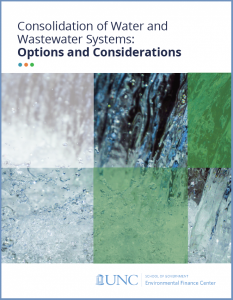Regional solutions, including consolidation of water and wastewater services, is one of many potential approaches that enable utilities to meet today’s needs and tomorrow’s demands. Joining resources and streamlining operations and decision-making can enhance efficiency. Partnerships between utilities can consist of a range of structures, including contracting of management, consolidation, and full mergers. For more information about partnerships involving interlocal agreements for purchasing/selling treatment services and formal arrangements for sharing treatment capacity and assets, view the companion resource on Crafting Interlocal Water And Wastewater Agreements.
Many factors need to be carefully considered and addressed before utilities enter into formal partnership arrangements. Through multiple projects and partnerships, the EFC is working to address those factors and research the possible outcomes of consolidation in various utility situations.
A variety of governance models exist for providing water and wastewater services in North Carolina. In many situations, a unit of government—such as a municipality or county—provides service primarily to the residents in its jurisdiction; however, there has been an increasing trend in the development of regional utilities in which multiple existing utilities merge to provide services to a larger geographic area or one utility expands and begins providing services well beyond its traditional border or governmental jurisdiction. This guide seeks to provide insight on how to develop fair, effective, and efficient consolidated services by focusing on organizational approaches currently allowed under North Carolina state law, and to flag and highlight considerations that should be addressed during evaluation and implementation.
Download the Consolidation of Water and Wastewater Systems: Options and Considerations guide.
Download The Resource



